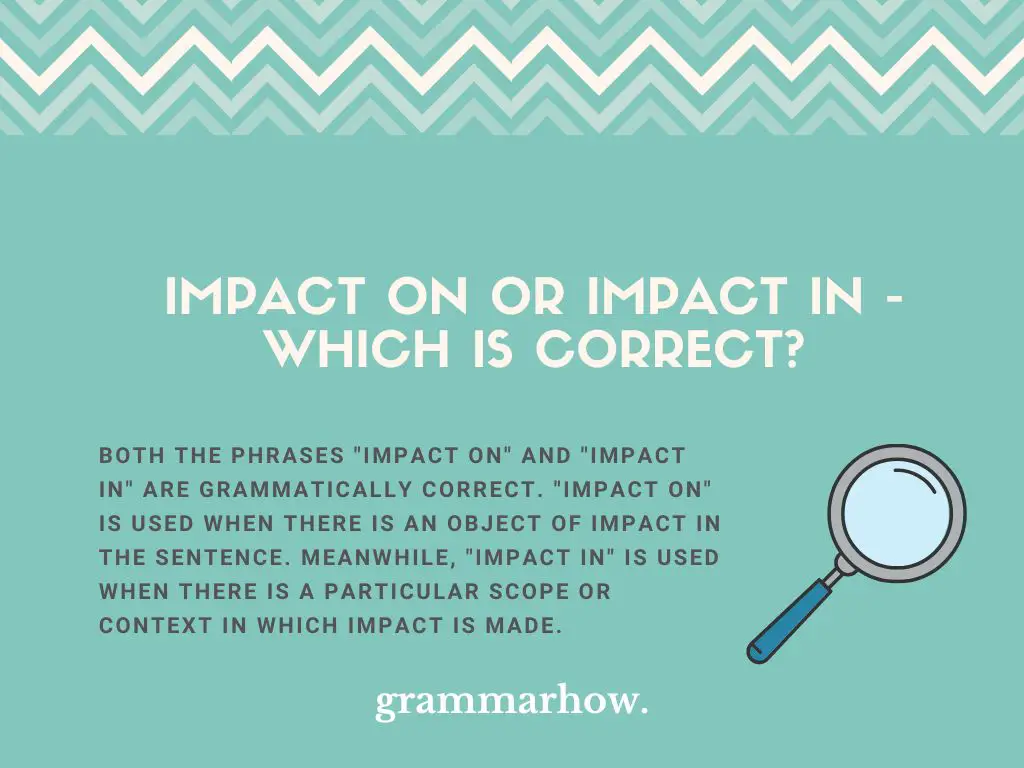One of the most complicated aspects of the English language is the use of prepositions. Prepositions such as “on” or “in” are used in similar situations, so it can be hard to tell when exactly to use which. This article tackles the phrases “impact on” and “impact in”.
Impact On or Impact In – Which Is Correct?
Both the phrases “impact on” and “impact in” are grammatically correct. “Impact on” is used when there is an object of impact in the sentence. Meanwhile, “impact in” is used when there is a particular scope or context in which impact is made.

The phrases “impact on” and “impact in” are both grammatically correct. However, they cannot be used interchangeably with one another because each phrase is used in different situations.
When there is an object of impact in the sentence, we use the phrase “impact on”. Take a look at the sentence below, for example:
- Social media has an impact on society.
In the above sentence, the object of impact is on “society”.
When there is a particular scope or context in which impact is made, we use the phrase “impact in”. See the sentence below, for example:
- Social media has an impact in society, particularly on the outcomes of elections.
The difference between the second example and the first example is that in the above sentence, the object of the impact is on “the outcomes of elections”. “Society”, which follows the phrase “impact in”, is merely the context in which the impact is made.
This also means that the prepositions “on” and “in” can be used in the same sentence.
Impact On
The phrase “impact on” is used to refer to the object of impact.
When you are referring to the object of impact, you need to use the phrase “impact on”. A good way to determine whether to use this phrase is to ask the following question: what is the impact being made on?
Below are examples of how to use “impact on” in a sentence:
- I’d like to make some sort of impact on the world before I die.
- I can’t stress enough how much of an impact on my life that book had when I first read it.
- She’s my favorite of all our presidents because of her impact on society.
- Watching this show while growing up had such an impact on my personality.
- The way McDonald’s started selling their food had a great impact on the fast-food industry.
Impact In
The phrase “impact in” is used to refer to the scope or context in which impact is being made.
When you are referring to where the impact is made, rather than the object of impact, you need to use the phrase “impact in”. To make sure you’re using the right phrase, you can ask yourself the following questions:
- In what scope or context is the impact being made?
- Where is the impact being made?
Below are examples of how to use “impact in” in a sentence:
- McDonald’s has made an impact in the fast-food industry, especially in the process of food production.
- She’s my favorite candidate because of the impact she has made in my community.
- With your credentials and your heart, I think you can really make an impact in this community.
- In my life, Simone has made a great impact.
- Whoever gets elected as president will have an impact in the realm of world politics.
Which Is Used the Most?
Based on data from Google Ngram Viewer, the phrase “impact on” is more popular than “impact in”.
Google Ngram Viewer can show us how often certain phrases are used in a wide range of books. Based on data from English books published between the years 1900-2019, we can see that the phrase “impact on” is more popular than “impact in”.

It’s interesting to note that both phrases were not often used from 1900-1930. It was only in the 1940s when the phrase “impact on” began to rise in popularity. It steadily increased until the 1980s, when the rate of usage seemed to stabilize.
Final Thoughts
The phrases “impact on” and “impact in” are both grammatically correct. They are, however, not interchangeable. We use “impact on” when there is an object of impact in the sentence. On the other hand, we use “impact in” when we are referring to an impact in a scope or context.

Martin holds a Master’s degree in Finance and International Business. He has six years of experience in professional communication with clients, executives, and colleagues. Furthermore, he has teaching experience from Aarhus University. Martin has been featured as an expert in communication and teaching on Forbes and Shopify. Read more about Martin here.
